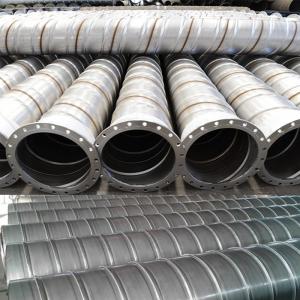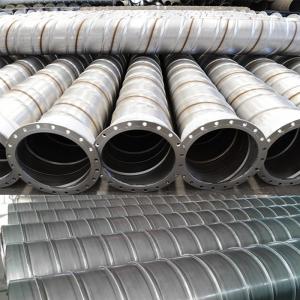Underground Rib Reinforced Spiral Welded Stainless Steel Pipe for Mining
- Loading Port:
- China main port
- Payment Terms:
- TT or LC
- Min Order Qty:
- 100 m
- Supply Capability:
- 10000 m/month
OKorder Service Pledge
OKorder Financial Service
You Might Also Like
Underground Rib Reinforced Spiral Welded Stainless Steel Pipe for Mining
Press grade: Maximum PN -0.097MPa
Size: DN300MM-DN1100MM
Standards:

Features:
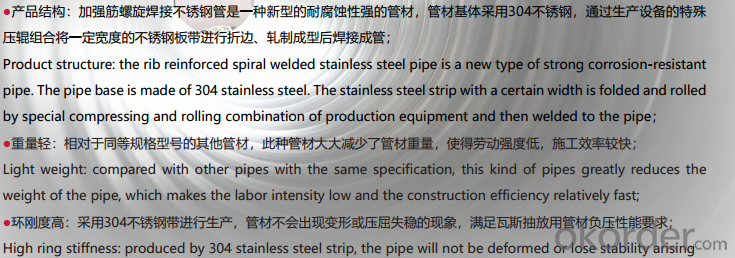
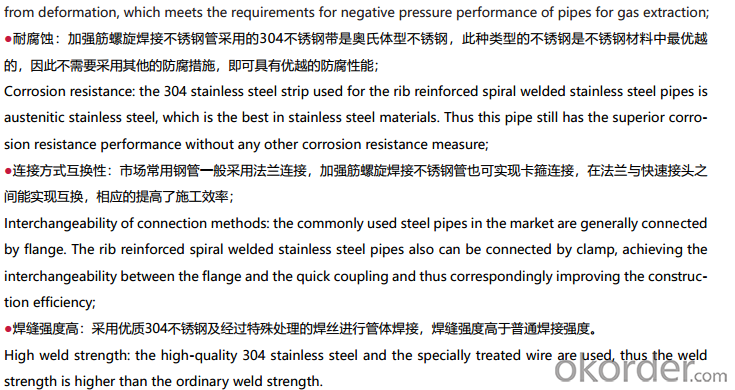
Specification:
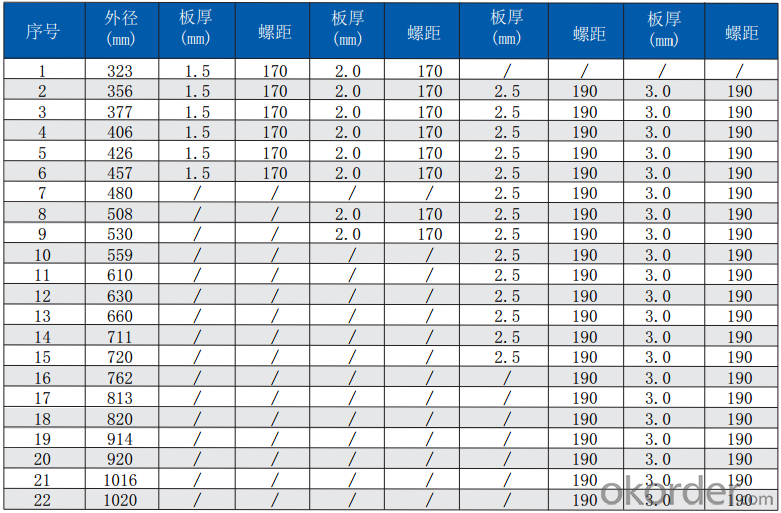
We own three industry bases for manufacturing pipes, fittings and new materials, including the biggest production line of steel wire reinforced PE composite pipe in the world, and top advanced PE pipe production line.
We get long term cooperation with leading material suppliers in the world and professionally provide the pipeline system solutions of matched products and technical cases by the whole industry chain from materials R&D to pipeline engineering installation.
- Q:How are steel pipes used in the manufacturing of solar power systems?
- Steel pipes are commonly used in the manufacturing of solar power systems for various purposes. They are used as structural supports for solar panels, providing stability and durability. Additionally, steel pipes are often utilized for the transportation of fluids such as water or heat transfer fluids, enabling the efficient circulation of these substances within the solar power system.
- Q:Can steel pipes be used for underground fuel pipelines?
- Yes, steel pipes can be used for underground fuel pipelines. Steel pipes are commonly used for various types of pipelines due to their durability, strength, and resistance to corrosion. When it comes to underground fuel pipelines, steel pipes are a popular choice due to their ability to withstand high pressure and temperature fluctuations. Additionally, steel pipes provide excellent protection against external elements, such as soil movement or chemical reactions, ensuring the safety and integrity of the fuel transportation system. Proper insulation and coating can further enhance the corrosion resistance of steel pipes, making them a reliable option for underground fuel pipelines.
- Q:How are steel pipes used in the telecommunications network infrastructure?
- Steel pipes are commonly used in the telecommunications network infrastructure as a means of protecting and housing underground cables. These pipes provide a durable and secure pathway for the cables, safeguarding them from environmental factors such as moisture, extreme temperatures, and physical damage. Additionally, steel pipes offer excellent strength and rigidity, allowing for the installation of multiple cables within a single pipe, thereby reducing costs and simplifying maintenance.
- Q:What is the difference between internal and external coating for steel pipes?
- A protective layer is applied to the inner surface of steel pipes, which is known as internal coating. The main purpose of this coating is to prevent corrosion and enhance resistance against chemicals present in the fluid being transported. Techniques like spraying, brushing, or dipping are commonly used to apply the internal coating, and it can be made of materials such as epoxy, polyurethane, or cement mortar. On the contrary, external coating involves the application of a protective layer on the outer surface of steel pipes. The main objective of this coating is to protect against environmental factors like corrosion, abrasion, and impact. External coatings are usually applied through methods like wrapping or coating with materials such as polyethylene, fusion-bonded epoxy, or asphalt enamel. To summarize, the primary difference between internal and external coating for steel pipes lies in their location and purpose. Internal coatings safeguard the inner surface from corrosion and chemical attacks, while external coatings provide protection against environmental damage on the outer surface. Both types of coatings are essential to ensure the durability and reliability of steel pipes in various applications.
- Q:How are steel pipes repaired in case of damage?
- Steel pipes are repaired in case of damage through various methods such as welding, patching, or replacing the damaged section. The appropriate repair technique depends on the type and extent of the damage to ensure the structural integrity and functionality of the pipe.
- Q:What are the applications of steel pipes in the automotive industry?
- Steel pipes are used in the automotive industry for a variety of applications, including exhaust systems, fuel lines, and structural components. They provide durability, corrosion resistance, and high strength, making them ideal for withstanding the harsh conditions and heavy loads experienced in automotive applications. Steel pipes also offer flexibility in design and can be tailored to meet specific requirements, ensuring efficient and reliable performance in vehicles.
- Q:Can steel pipes be used for firefighting systems?
- Yes, steel pipes can be used for firefighting systems. Steel pipes are commonly used for their durability and resistance to high temperatures, making them suitable for transporting water and other fire suppression agents. They are typically used in larger commercial or industrial buildings where the fire protection system requires a higher flow rate and pressure. Steel pipes also have the advantage of being able to withstand external forces and impacts, ensuring the integrity of the firefighting system. Additionally, steel pipes can be easily connected, making them convenient for installation and maintenance purposes. However, it is important to ensure that the steel pipes used for firefighting systems are properly treated to prevent corrosion and rusting, as this can compromise their effectiveness in an emergency situation. Regular inspections and maintenance should be conducted to ensure the reliability and functionality of the steel pipes within the firefighting system.
- Q:What is the difference between carbon steel and cast iron pipes?
- Carbon steel and cast iron pipes are both widely used in various industries for different applications. The main difference between these two types of pipes lies in their composition and properties. 1. Composition: Carbon steel pipes are primarily made of iron and carbon, with trace amounts of other elements such as manganese, phosphorus, and sulfur. On the other hand, cast iron pipes are made by melting iron and adding a small amount of carbon, usually between 2-4%. 2. Strength and Durability: Carbon steel pipes are generally stronger and more durable than cast iron pipes. Carbon steel has a higher tensile strength, which means it can withstand higher pressures and is less likely to be damaged or deformed. Cast iron, although strong, is more brittle and prone to cracking. 3. Corrosion Resistance: Carbon steel pipes require additional coatings or treatments to protect them from corrosion. Without proper protection, carbon steel pipes can be susceptible to rust and corrosion, especially when exposed to moisture or aggressive substances. On the other hand, cast iron pipes have inherent corrosion resistance due to the formation of a protective layer of iron oxide (rust) on their surface. 4. Weight and Installation: Cast iron pipes are typically heavier than carbon steel pipes, making them more challenging to handle and install. Carbon steel pipes are comparatively lighter, allowing for easier transportation and installation. 5. Noise and Vibration: Cast iron pipes have superior sound-deadening properties, making them quieter when fluids flow through them. On the contrary, carbon steel pipes tend to transmit more noise and vibrations. 6. Cost: Cast iron pipes are generally more expensive than carbon steel pipes due to the additional manufacturing processes and the higher cost of raw materials. In summary, the main differences between carbon steel and cast iron pipes lie in their composition, strength, corrosion resistance, weight, noise transmission, and cost. The choice between the two depends on the specific application, budget, and environmental factors.
- Q:What are the different methods of joining steel pipes together?
- There are several methods of joining steel pipes together, including welding, threading, flange connection, and mechanical coupling.
- Q:Can steel pipes be used for swimming pool installations?
- Yes, steel pipes can be used for swimming pool installations. Steel pipes are known for their durability and strength, making them a suitable choice for underground or aboveground swimming pool plumbing systems. They are capable of handling high water pressure and can withstand the corrosive effects of pool chemicals. Additionally, steel pipes are resistant to extreme weather conditions and can be easily installed and maintained. However, it is important to ensure that the steel pipes are properly treated and coated to prevent rust and corrosion.
1. Manufacturer Overview |
|
|---|---|
| Location | |
| Year Established | |
| Annual Output Value | |
| Main Markets | |
| Company Certifications | |
2. Manufacturer Certificates |
|
|---|---|
| a) Certification Name | |
| Range | |
| Reference | |
| Validity Period | |
3. Manufacturer Capability |
|
|---|---|
| a)Trade Capacity | |
| Nearest Port | |
| Export Percentage | |
| No.of Employees in Trade Department | |
| Language Spoken: | |
| b)Factory Information | |
| Factory Size: | |
| No. of Production Lines | |
| Contract Manufacturing | |
| Product Price Range | |
Send your message to us
Underground Rib Reinforced Spiral Welded Stainless Steel Pipe for Mining
- Loading Port:
- China main port
- Payment Terms:
- TT or LC
- Min Order Qty:
- 100 m
- Supply Capability:
- 10000 m/month
OKorder Service Pledge
OKorder Financial Service
Similar products
New products
Hot products
Related keywords
